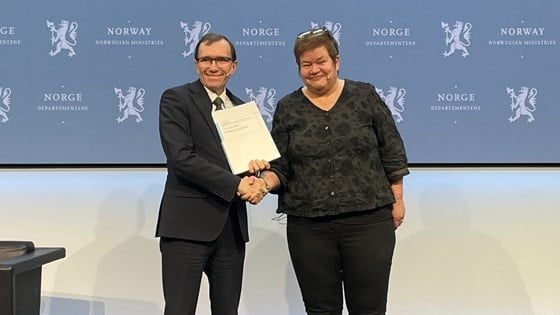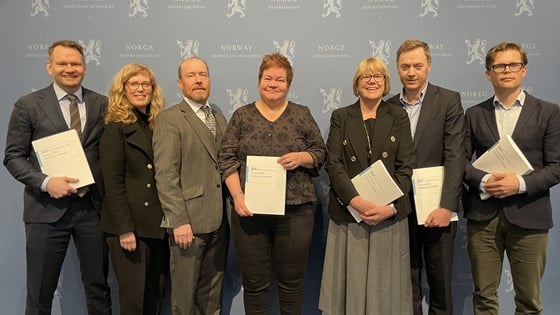Review of Norway’s experience of cooperation under the EEA Agreement
Press release | Date: 21/04/2024 | Ministry of Foreign Affairs
Today, Minister of Foreign Affairs Espen Barth Eide was presented with a report on Norway’s experience of cooperation under the EEA Agreement since 2012.

In May 2022, the Government appointed a committee to review Norway’s experience of cooperation under the EEA Agreement and other agreements Norway has had with the EU over the past 10 years. Today the committee delivered its conclusions to Foreign Minister Eide in the form of an Official Norwegian Report.
‘The EEA Agreement has served Norway well for 30 years. The report clearly shows that the Agreement offers Norway and Norwegian citizens and businesses a wider range of advantages than other, less binding agreements would provide,’ said Mr Eide.
The report sets out a number of concrete recommendations on how Norway should administer the Agreement and make full use of the opportunities it provides.
‘The report has come at an opportune time. The Nordic countries, Europe and the rest of the world are undergoing major changes, and developments in the EU are taking place at a rapidly increasing pace. We will now go through the committee’s recommendations with a view to safeguarding Norwegian interests as effectively as possible within the framework of the Agreement,’ said the Foreign Minister.
The report will be circulated for comment.
‘The Government commissioned this report to obtain up-to-date insight into the benefits of the EEA Agreement. The report provides important answers and assessments on key issues. In particular it highlights the impacts on Europe of Brexit, the COVID-19 pandemic and the war in Ukraine. The report makes it clear that the EEA Agreement is essential to safeguard Norway’s relationship with the EU. There is a need for a knowledge-based discussion about Europe, the EU and the EEA, and I hope many will take the time to read the report,’ said Mr Eide.
The EEA Agreement

The main purpose of the EEA Agreement is to allow Norway, Iceland and Liechtenstein to participate in the EU’s internal market. The internal market comprises 30 countries in Europe (27 EU member states plus Norway, Iceland and Liechtenstein) and more than 450 million citizens. The Agreement entered into force on 1 January 1994
The EEA Agreement provides Norwegians and Norwegian businesses with the same rights and obligations as citizens and businesses in other EEA countries, including the right to work, invest, study and live in EEA countries, and the right to buy and sell goods and services. The EEA Agreement provides the framework for cooperation in key areas, such as environmental protection, education, research, innovation and technology, information services, transport, energy, electronic communications, gender equality, statistics, small- and medium-sized enterprises, cultural and media issues, tourism, civil protection, health and consumer issues, labour market issues and social issues.
About the review committee
In May 2022, the Norwegian Government appointed a broad-based committee to review Norway’s experience of cooperation under the EEA Agreement over the past 10 years. The mandate of the committee was to provide recommendations on how to safeguard Norwegian interests most effectively in our cooperation with the EU under the framework of the EEA Agreement. The committee also assessed the experience of the UK, Switzerland and Canada in connection with their respective forms of cooperation with the EU.
The committee was headed by Line Eldring, Director of the Norwegian United Federation of Trade Unions.
Other members of the committee were:
- Stig Eidissen, Lawyer, Norwegian Association of Local and Regional Authorities (KS)
- Halvard Haukeland Fredriksen, Professor, University of Bergen
- Oda Helen Sletnes, former diplomat
- Christian Anton Smedshaug, Managing Director, AgriAnalyse
- Anne Elizabeth Stie, Associate Professor, University of Agder
- Knut Erling Sunde, Director, Federation of Norwegian Industries